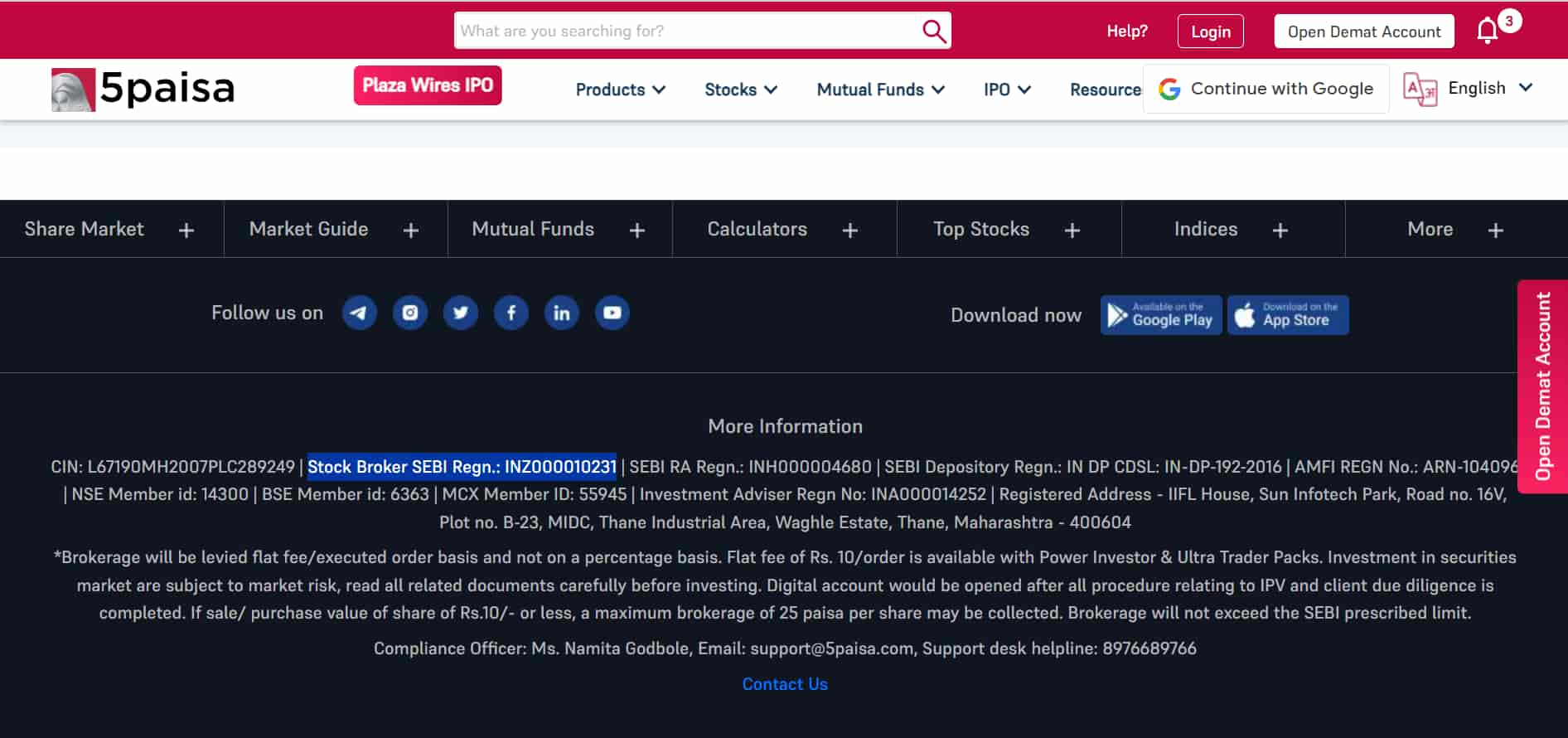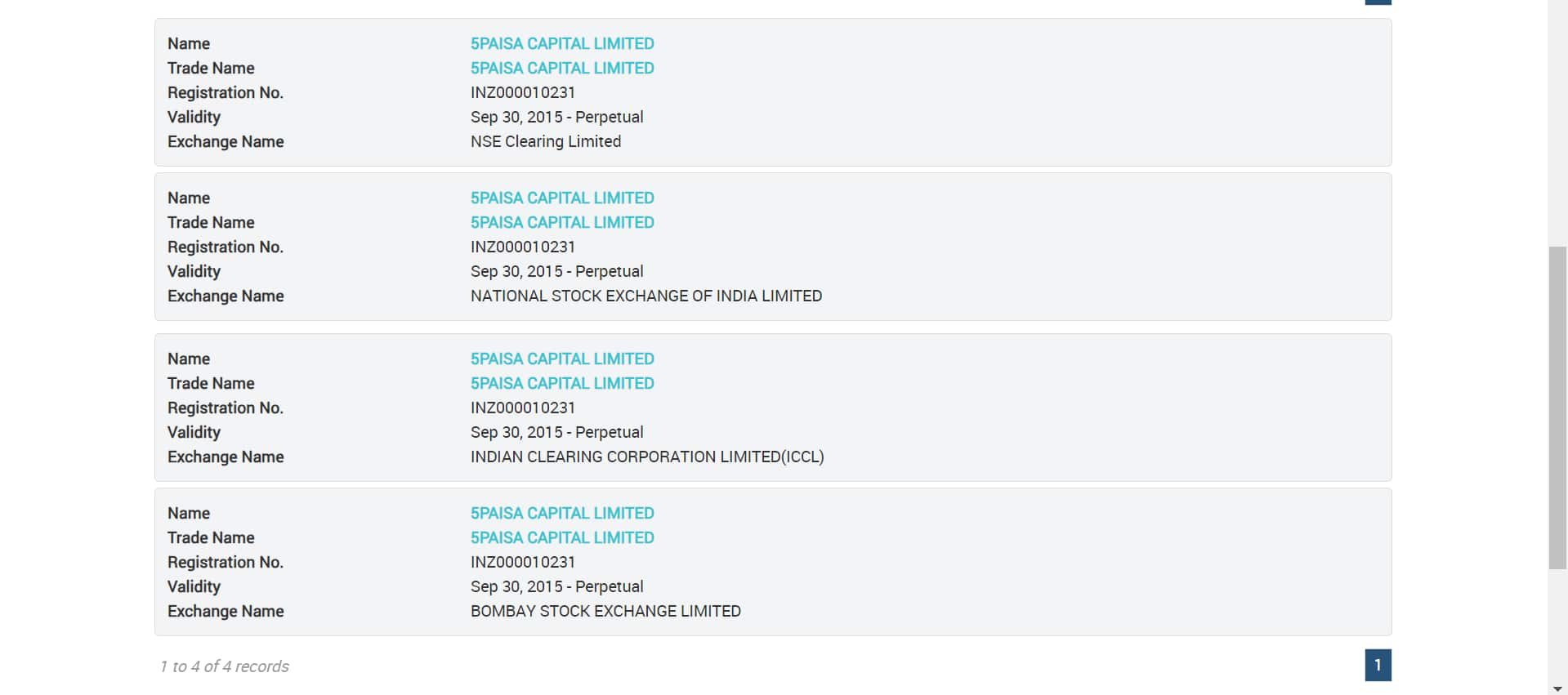Which is The Best SEBI Registered Broker in India?

The best SEBI registered broker in India - AvaTrade
Best SEBI registered brokers in India include:
-
AvaTrade - good choice for traders from India
-
Saxo Bank - egulated in 15 jurisdictions
-
FP Markets - low spreads, from 0.0 pips
-
IG.com - great deposit and withdrawal options
-
Forex.com - attractive trading conditions are tight spreads
When it comes to Forex trading in India, choosing the right broker is paramount. Trust and transparency are what traders seek, and this is what the Securities and Exchange Board of India (SEBI) registered Forex brokers capitalize on. Such brokers not only offer a wide variety of currency pairs to trade but also follow the rules set by SEBI. In this article, the experts at TU will discuss the list of the best SEBI-registered Forex brokers in India, helping you make smart choices and trade Forex with confidence.
Which brokers are SEBI-regulated in India?
SEBI is the regulator in charge of overseeing and approving Forex brokers in India. It has laid down strict rules and guidelines that Forex brokers must follow. This oversight by SEBI helps protect the interests of traders and gives them confidence that the brokers they choose are trustworthy. Brokers regulated by SEBI have potentially met all of SEBI's rules and regulations, proving that they are reliable and follow the law. This approval shows their commitment to following the rules and looking out for their clients' best interests. According to experts at TU, the top 5 SEBI-regulated international Forex brokers are:
AvaTrade
AvaTrade presents an intriguing option in the world of online trading. The platform's global presence offers Indian traders the opportunity to trade a wide range of financial instruments, including Forex, stocks commodities, and cryptocurrencies. Particularly, AvaTrade is known for supporting a variety of trading platforms, including the popular MetaTrader 4. While AvaTrade is regulated by multiple authorities worldwide, including the Central Bank of Ireland and the Financial Services Commission of the British Virgin Islands, it's important for Indian traders to be mindful of the specific regulatory framework set by the RBI and SEBI for Forex trading within the country.
👍 Pros
• Customer Support – The platform provides strong customer support, with multiple channels for assistance, including phone, email, and live chat, ensuring that traders can get help when needed.
• Demo Account – AvaTrade offers a free demo account, allowing traders to practice and test strategies without risking real money.
👎 Cons
• Complex Site Interface – According to various reviews, the interface of AvaTrade is often deemed complex to navigate by beginners.
• Inactivity Fees – AvaTrade charges inactivity fees for accounts that remain dormant for a certain period, which can be a drawback for traders who prefer infrequent trading.
Saxo Bank
Saxo Bank, a well-established European Forex broker, offers Indian traders access to a robust trading platform with a comprehensive range of financial instruments, including Forex, stocks, commodities, and more. The platform's reputation for reliability and regulatory compliance, with licenses from other top-tier authorities like the FCA in the UK, instils confidence among Indian traders.
👍 Pros
• Diverse Asset Selection – The platform provides a wide range of trading instruments, with over 40 thousand instruments available for trading including Forex, stocks, commodities, and bonds, allowing Indian traders to diversify their portfolios.
• Advanced Trading Tools – Saxo Bank offers a suite of advanced trading tools and research resources, catering to both novice and experienced traders looking for in-depth market analysis.
👎 Cons
• Complex Fee Structure – Some Indian traders may find Saxo Bank's fee structure complex, with various account types and fee components, potentially making it challenging to calculate the overall cost of trading.
• High Initial Deposit – Saxo Bank typically requires a higher initial deposit compared to some other brokers, which could be a barrier for traders with limited capital.
FP Markets
FP Markets stands out as a Forex broker in India with several unique features. Firstly, the platform offers a Direct Market Access (DMA) pricing model, allowing Indian traders access to deep liquidity and transparent market execution. This feature is particularly appealing to those seeking a trading environment where orders are routed directly to liquidity providers, enhancing price transparency, and potentially leading to better trading conditions. Additionally, FP Markets provides an extensive range of trading platforms, including MetaTrader 4 and MetaTrader 5, as well as the IRESS platform, offering diverse options for traders of varying experience levels.
Another distinctive feature is FP Markets' Multi Account Manager (MAM) solution, which is beneficial for Indian traders looking to manage multiple trading accounts or invest in a managed account. This feature simplifies the process of trading on behalf of clients, making it suitable for professional traders and money managers. FP Markets also offers competitive spreads and leverages, along with a wide range of trading instruments, including Forex, stocks, commodities, and cryptocurrencies, providing Indian traders with ample opportunities for diversification.
👍 Pros
• Variety of Trading Platforms – The availability of multiple trading platforms, including MetaTrader 4, MetaTrader 5, and IRESS, caters to the diverse preferences and needs of traders.
• MAM Solution – The Multi Account Manager (MAM) solution is a valuable feature for traders managing multiple accounts or seeking managed account options, making it suitable for professional traders and money managers.
👎 Cons
• Complexity for Novices – The verification process, Direct Market Access (DMA) pricing model, and advanced features can be complex for novice traders, potentially requiring a steeper learning curve.
• Limited Local Presence – FP Markets may have a limited physical presence in India, which can affect customer support and accessibility for Indian traders.
IG.com
From an Indian standpoint, IG.com stands as a reputable and globally recognized online broker, providing Indian traders access to a wide range of financial instruments, including Forex, indices, commodities, and shares. With its strong regulatory framework, including authorization from the Financial Conduct Authority (FCA) in the UK, IG.com offers Indian traders a sense of security and trustworthiness.
👍 Pros
• Regulatory Trust – Apart from SEBI, IG.com is also regulated by other top-tier authorities, including the FCA, instilling confidence in Indian traders about the platform's credibility and commitment to adhering to financial regulations.
• Diverse Asset Selection – Indian traders have access to a broad range of financial instruments, enabling them to diversify their portfolios and explore various global markets.
👎 Cons
• Inactivity Fees – IG.com charges inactivity fees for accounts that remain dormant for a certain period, which can be a drawback for traders who prefer infrequent trading.
• Potentially High Costs – Some Indian traders may find that IG.com's fee structure, including spreads and commissions, can be relatively high compared to other local brokers, which may impact the overall cost of trading.
Forex.com
For Indian traders looking to venture into the world of Forex, Forex.com presents a noteworthy option. The platform's global presence provides Indian traders with access to a diverse set of trading instruments, including major and minor currency pairs, commodities, indices, and cryptocurrencies. Its reputation for reliability and regulation in multiple jurisdictions, including the United States, offers Indian traders a sense of security when engaging in Forex activities.
Forex.com can be a suitable option for Indian traders seeking exposure to global Forex markets. However, due diligence and a clear understanding of Indian Forex regulations are essential to ensure a smooth and compliant trading experience. Traders should weigh the platform's pros and cons carefully based on their specific requirements and preferences.
👍 Pros
• Diverse Asset Selection – Forex.com offers trading in over 80+ currency pairs, and over 5,500 markets, including FX, indices, commodities, stocks, and cryptocurrencies.
• Educational Resources – The platform's extensive educational resources can be particularly beneficial for Indian traders who may be new to Forex trading. Access to webinars, tutorials, and market analysis can aid in building trading knowledge.
👎 Cons
• Narrow deposit and withdrawal options – Forex.com only offers a few options for depositing and withdrawing funds, making it difficult for traders not having access to those methods.
• High Spreads – Indian traders may find that Forex.com's spreads can be on the higher side compared to local brokers, potentially impacting the overall cost of trading.
Rules and Regulation
Licensing in India
In India, brokers are regulated by the Reserve Bank of India (RBI) and the Securities and Exchange Board of India (SEBI). The former supervises foreign currency and the latter controls the stock market. The conditions for obtaining a license are: sufficient capital, a detailed business plan, compliance with rules and regulations, professional qualifications of key employees, and a professional reputation of the applicant.
Investor protection in India
To resolve disputes, traders can approach the RBI and SEBI that prevent fraud and dishonest activity in the securities market.
Taxation in India
Traders in India are subject to two primary types of taxes: direct and indirect. Direct taxes include a 5%-30% income tax. Capital gains tax is 15% for short-term profits and 10% for long-term ones. Trading income under 2.5 lakhs of Indian rupees is not taxable.
Are all SEBI registered brokers safe?
The safety of your chosen Forex broker is a top priority when engaging in Forex trading. Brokers in India can be categorized into two types – those offering Forex trading as part of their services and those exclusively focused on currency trading. Brokers providing Forex trading services in India must register with SEBI as a Foreign Institutional Investor (FII) or a sub-account, a process that involves meeting specific criteria and adhering to SEBI's currency derivative trading guidelines. SEBI-regulated brokers are held accountable for their actions, adding an extra layer of security for traders. Further, they also provide the advantage of offering currency pairs that include the Indian Rupee (INR), allowing Indian traders to participate in the global Forex market while operating within the bounds of the law.
How to verify SEBI authorisation
You can verify SEBI authorisation of brokers by following these three simple steps:

How to verify SEBI authorisation
Step 1 – Start by locating the SEBI registration number within the disclosure text displayed at the bottom of the broker's homepage.

How to verify SEBI authorisation
Step 2 – Search this registration number on the SEBI’s currency derivatives brokers segment

How to verify SEBI authorisation
Step 3 – Verify your broker’s name and registration number in the results section. If your broker is not appearing, try searching by its name via the “Name / Trade Name” tab.
Steps to start Forex trading in India
Step 1 – Opening a currency trading account
Embarking on your Forex trading journey begins with selecting a suitable Forex trading platform and initiating the process of opening a currency trading account. In India, this account serves as your gateway to the world of Forex trading. While opening a Demat account is not mandatory, most brokers offer a two-in-one account, encompassing both trading and a Demat account for enhanced convenience.
Step 2 – Submitting KYC documents
Compliance with the Know Your Customer (KYC) requirements is a pivotal step. It involves the submission of essential documents to verify your identity, address, income, and bank account details. Once these documents are submitted to the broker, a thorough verification process ensues. After the review, you will receive a notification confirming your application's approval or rejection.
Step 3 – Choosing a currency pair
Currency trading revolves around pairs, and beginners often opt for the most commonly traded major currency pairs. However, if you possess the willingness and adequate funds in your trading account, you have the flexibility to trade any currency pair that captures your interest. It’s important to note that India traders only have a limited number of options to choose from when it comes to Forex trading pairs.
Step 4 – Formulating a strategy
Based on the currency pair you choose, formulate a strategy, and continuously refine it through demo trading and back testing. Once you believe that the strategy would fare well in live markets, you may start your Forex trading journey with a small initial capital. Remember to only risk the capital you can afford to lose.
Step 5 – Trading in the live markets
This is where everything comes together. With your chosen broker, currency pair, and strategy, venture into the Forex market and gauge the results. Take corrective action as and when required.
For beginners, it’s vital to keep in mind that Forex trading is not a realm where instant success is guaranteed. It demands patience, dedication, and continuous learning. Over time, traders amass knowledge and experience, paving the path to profitable trading.
How much money do I need to trade Forex in India?
The minimum amount required to trade Forex in India can vary from one broker to another, and there isn't a standard minimum amount. It's smart to put in a bit more than the minimum so that you have some flexibility if you lose some money.
When using a Forex broker located outside of India that provides micro contracts, you can engage in Forex trading with as little as $100, which is approximately equivalent to 8,150 Indian Rupees. However, some brokers don't insist on a specific minimum deposit. They might ask you to deposit an amount that's suitable for the kind of currency trading you want to do. Some brokers also give bonuses to new traders. It's like a welcome gift to encourage you to start trading. Lastly, there are also brokers who ask for very little or even no initial deposit.
Summary
In conclusion, Forex trading in India offers exciting opportunities but requires careful consideration of regulations and the choice of a reputable broker. SEBI-regulated brokers are expected to uphold the highest standards of transparency and legality, making them a safe choice for Indian traders. Further, it's essential to understand the limitations and complexities of the Indian Forex trading landscape and start trading with a well-informed approach.
FAQs
Does SEBI regulate Forex trading?
SEBI overseas Forex trading in India by enforcing important rules and guidelines, notably the Foreign Exchange Management Act (FEMA) of 1999. This legislation not only governs foreign exchange transactions within the country but also strictly mandates that individuals can only engage in foreign exchange or securities dealings through authorized dealers.
Is OctaFX registered with SEBI?
OctaFX is an international Forex broker operating globally, including in India. While OctaFX is not directly regulated by Indian authorities like SEBI or the RBI, it is regulated by reputable international financial authorities.
Does Zerodha allow Forex trading?
Yes, Zerodha provides the option for Forex (currency) trading. You can participate in currency derivatives trading on the BSE and NSE exchanges through your Zerodha trading account. To get started with currency trading, customers need to enable the Currency trading segment before initiating any currency trades.
How do I know if a broker is SEBI registered?
Every stock market broker is required to prominently display their SEBI, NSE, or BSE registration ID on their official website. If your broker does not have a website, you can still verify their registration by using the SEBI Broker Registration portal. Additionally, for sub-brokers, you have the option to request an authorization certificate number from NSE. This ensures transparency and authenticity in the financial services industry.
Team that worked on the article
Chinmay Soni is a financial analyst with more than 5 years of experience in working with stocks, Forex, derivatives, and other assets. As a founder of a boutique research firm and an active researcher, he covers various industries and fields, providing insights backed by statistical data. He is also an educator in the field of finance and technology.
As an author for Traders Union, he contributes his deep analytical insights on various topics, taking into account various aspects.
Dr. BJ Johnson is a PhD in English Language and an editor with over 15 years of experience. He earned his degree in English Language in the U.S and the UK. In 2020, Dr. Johnson joined the Traders Union team. Since then, he has created over 100 exclusive articles and edited over 300 articles of other authors.
Mirjan Hipolito is a journalist and news editor at Traders Union. She is an expert crypto writer with five years of experience in the financial markets. Her specialties are daily market news, price predictions, and Initial Coin Offerings (ICO).















